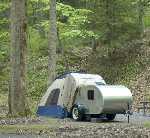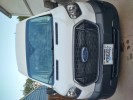solid vs stranded wire for 12 volt
30 posts
• Page 2 of 2 • 1, 2
You definately want to use stranded wire in mobile applications. Mark Nemeth's 12 Volt Side of Life website offers lots of tips on 12 volt system design and contains a handy chart to determine the approprite wire gage for the anticipated circuit maximum current draw. As an added safety factor, I always upgage one wire size and then protect the circuit with a fuse rated just above the maximum anticipated current when all loads on that circuit are energized at the same time.
http://www.ccis.com/home/mnemeth/12volt/12volta.htm
http://www.ccis.com/home/mnemeth/12volt/12volta.htm
-

Michael W - Teardrop Master
- Posts: 138
- Images: 34
- Joined: Wed Jun 01, 2005 10:09 am
- Location: SE Michigan
Cutterpup wrote:
In my house the lights and most of the oulets are 14 gauge wire except in the kitchen, and the pool circuits which are 12 gauge.
So even if its free using very large wires bigger will cause problems. Use 12 gauge for an A/C or heater larger than 1800 watts. Voltage drop in a 12 to 15 foot trail is minor.
Dan
Remember that the wire has to be protected by a circuit breaker. In most commercial applications, 20Amps is the minimum circuit breaker size. Residential use is about the only place where you find a 15A circuit breaker. So, unless you install a 15A circuit breaker in your trailer (always a good idea), chances are that the circuit breaker at a camp ground will not protect a #14 wire from an overload. This is especially true since the NEC requires a 20A receptacle for RV power. I'd use a #12awg minimum for 120V shore power. Also, a #14 wire is rated for 15 amps but small molded case circuit breakers are only rated for 80% of the nameplate ampacity, meaning you should use a #12 for a load larger than 1440 watts and a #10 for a load larger than 1920 watts, etc. Fuses are 100% rated so you can size the wire at the same rating as the fuse.
Persnickity Bruce
2009 6.5'X11' TTT - Boxcar
All it takes is a speck of faith and a few kilowatts of sweat and grace.

Boxcar Build
aVANger Build
All it takes is a speck of faith and a few kilowatts of sweat and grace.

Boxcar Build
aVANger Build
-

bdosborn - Donating Member
- Posts: 5595
- Images: 806
- Joined: Wed May 05, 2004 11:10 pm
- Location: CO, Littleton

 And don't expect a straight answer. Here's as straight as it gets:
And don't expect a straight answer. Here's as straight as it gets:

